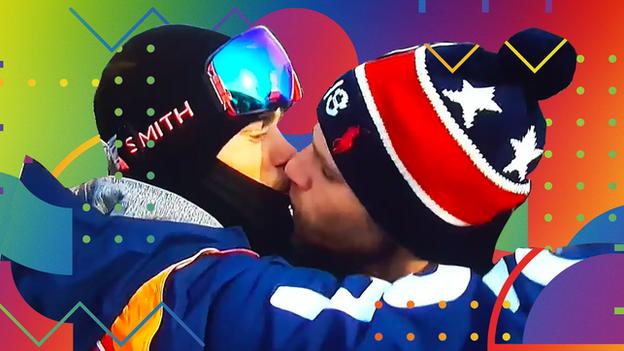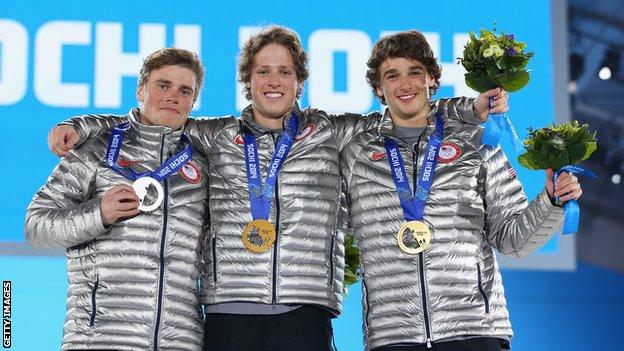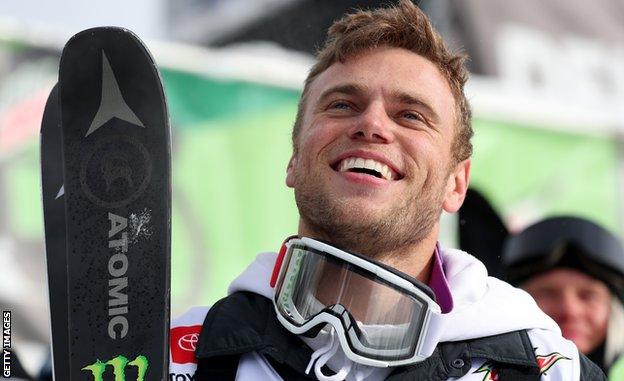Neither Gus Kenworthy nor his then-boyfriend knew the cameras were rolling when they shared a seminal kiss at Pyeongchang 2018.
By Nick HopeBBC Olympic sports reporter

Warning: This article includes references to suicide and mental health issues.
Gus Kenworthy was looking to better his surprise silver from the event’s Olympic debut four years earlier in Russia and the skier was confident. Preparation had been very different this time around.
Before Sochi 2014 he’d been “terrified of being outed” in a country where homosexuality was illegal and had worried he might be chased out of the sport.
Now the American was one of two openly gay men in the USA team. He’d been “so shocked” by the way the LGBT+ community and a plethora of sponsors had backed him after coming out in 2015 that he was desperate to thank them with success in Pyeongchang.
Unfortunately, things didn’t go to plan. But he still found himself at the centre of a dizzying global focus, for unexpected reasons.
Kenworthy fell on his first run in the final and suffered a similar fate in the second, leaving him “devastated” as his Olympic medal bid ended.
All he wanted was to quietly retreat to the comfort of family and friends, but his agent intervened and directed him towards the eager reporters desperate for his attention. Kenworthy was confused.
“They were all going ‘tell us about the kiss’ and I had no idea what they were talking about,” he tells BBC Sport.

Without his knowledge, American broadcaster NBC had been filming him live as he spoke to family and kissed his boyfriend before heading up to the start.
Thanks to the power of social media, the kiss became one of the most iconic images of the Games and was celebrated as a significant step towards the greater acceptance of the LGBT+ community within elite sport.
“It was such a tame kiss,” says Kenworthy with a smile. “For sure I’d have made it more dramatic if I’d known it was going to be this big deal moment!
“As a kid if I’d seen that it would have signalled to me that I was OK, that I was safe, there was a future for me. It would probably have saved me a lot of years of heartache.”

Kenworthy was five when he realised he was “different” to other boys. He worried about it.
With no obvious high-profile gay role models, he would mimic the views of friends, as well as his older brother, in the hope of “appearing normal”. He would go to extreme lengths to hide his “big, dark secret”.
“It played a pretty debilitating role on my mental health because I had this fear and dread that there was something wrong with me,” he says.
“When I was on ski trips with overnights, I would make sure I was the last person in the room to fall asleep because I was scared I’d talk in my sleep and out myself as gay.
“I thought that if people found out then no-one would speak to me again, that I’d be kicked out of my home and would never have a career in skiing. It was super damaging.”
Kenworthy’s anxiety only grew during his teen years, when team-mates would casually use homophobic language, describing the weather or judging a course they didn’t like as “gay”.
“It didn’t help that everything to do with sponsors and contracts is based around image,” he adds.
“With no-one else in my sport ‘out’, I got it into my head that no-one would want to be associated with the ‘gay skier’ so everything would be taken away from me.”

Homophobia was drawn into the mainstream spotlight in the build-up to the Sochi 2014 Olympics after the host nation – Russia – introduced new ‘anti-gay’ legislation, provoking widespread criticism across the globe.
Unsurprisingly Kenworthy was in a “weird head space” going into the Games, with his fears and anxiety heightened, so he tried to blend in and lay low.
“I felt like I was going into the lion’s den because it was a country and political atmosphere that completely didn’t support me,” he says. “Then I was thinking, ‘well, I don’t even support me and I’m not even brave enough to stand my ground and be who I am’.
“I had a boyfriend at the time who was out there working in the media and he was also in the closet and it felt like this forbidden love.”
Despite the stress, it was a highly successful Olympics for the slopestyle specialist, as he claimed silver as part of a historic USA podium lockout.
However, what should have been an incredible time – as he achieved a lifelong dream – quickly became a living nightmare.
“I had a secret plan to come out in Russia as a middle finger to the legislation, as a kind of protest,” Kenworthy says. “I didn’t do it, I was too scared and wasn’t ready, but it ate away at me.
“Then there was the media tour, which following a medal is the most exciting and fun thing that happens to most athletes as you’re showered in attention and appreciation, but I was really struggling and I considered killing myself.
“It didn’t help that we were doing all of these interviews the day before Valentine’s Day and in each one they were asking us ‘who’s your celebrity crush?’ or ‘who’s your dream date?’ and I felt so fake and horrible about myself lying in all of them.”
Some 18 months later he could no longer tolerate living a double life. After revealing his sexuality to family and friends he then came out publicly.
“I got to the point where I couldn’t go on like it anymore,” he says.
“I’d also had this realisation that I’d kind of got everything I wanted in terms of an Olympic medal and X Games medals so if I did lose everything and I was chased out of the sport I felt I could leave with my head held high.”
The response was more positive than he could ever have imagined.

“With each person I told this huge weight was lifted off my shoulders,” recalls Kenworthy. “I felt so free and liberated, which was incredible and heart-warming.
“I then did it in a really public way to reach anybody who, like me, was in the closet and felt for whatever reason that they couldn’t come out. It was amazingly well-received.”
What followed was a season which Kenworthy describes as his “best ever” and a podium finish in every event he entered.
Heading into the Winter Olympics of 2018, Kenworthy was one of the favourites. With the backing of the LGBT+ community, an army of personal sponsors and a supportive tweet from his “idol” Britney Spears, he was feeling confident.
There were those who were not quite as supportive, though.
“Some of the stuff on social media was really dark,” he says. “Because [US figure skater] Adam Rippon and I were both ‘out’, we were receiving death threats.
“People would tweet us saying ‘I hope you break your legs’, ‘I hope the world gets to watch you get hurt’ or ‘I hope you break your neck and die’. Stuff other athletes didn’t have to deal with.”
Kenworthy’s two falls meant he finished 12th – last place – in the slopestyle final. While he is still disappointed with the result, he looks back on the Games much more positively.
“It’s incredible that the kiss was broadcast and beamed into homes all around the world and in countries where homosexuality is still illegal,” he says.
“I know it was just a tame kiss and one we didn’t think about at the time, but representation matters.”

Kenworthy is still hoping for one last medal-winning moment at what he expects will be his final Winter Olympics in Beijing next year, and he will do so in British rather than USA colours after switching to represent the nation of his birth.
“My mum is British and for the last eight years she’s proudly waved the USA flag for me,” he says.
“Now I’d love to wave the Union Jack for her, so I’m going for Team GB and GB Snowsport, who have been so supportive.”
Canadian figure skater Eric Radford made history by becoming the first openly gay male Winter Olympic champion at Pyeongchang 2018 and Kenworthy now dreams of following him by topping the podium himself in China.
“Getting back on the podium while representing Great Britain and the LGBT+ community would mean everything,” he says.
“Actually, it would be my crowning achievement.”
If you’ve been affected by issues raised in this article, there is information and support available on BBC Action Line.